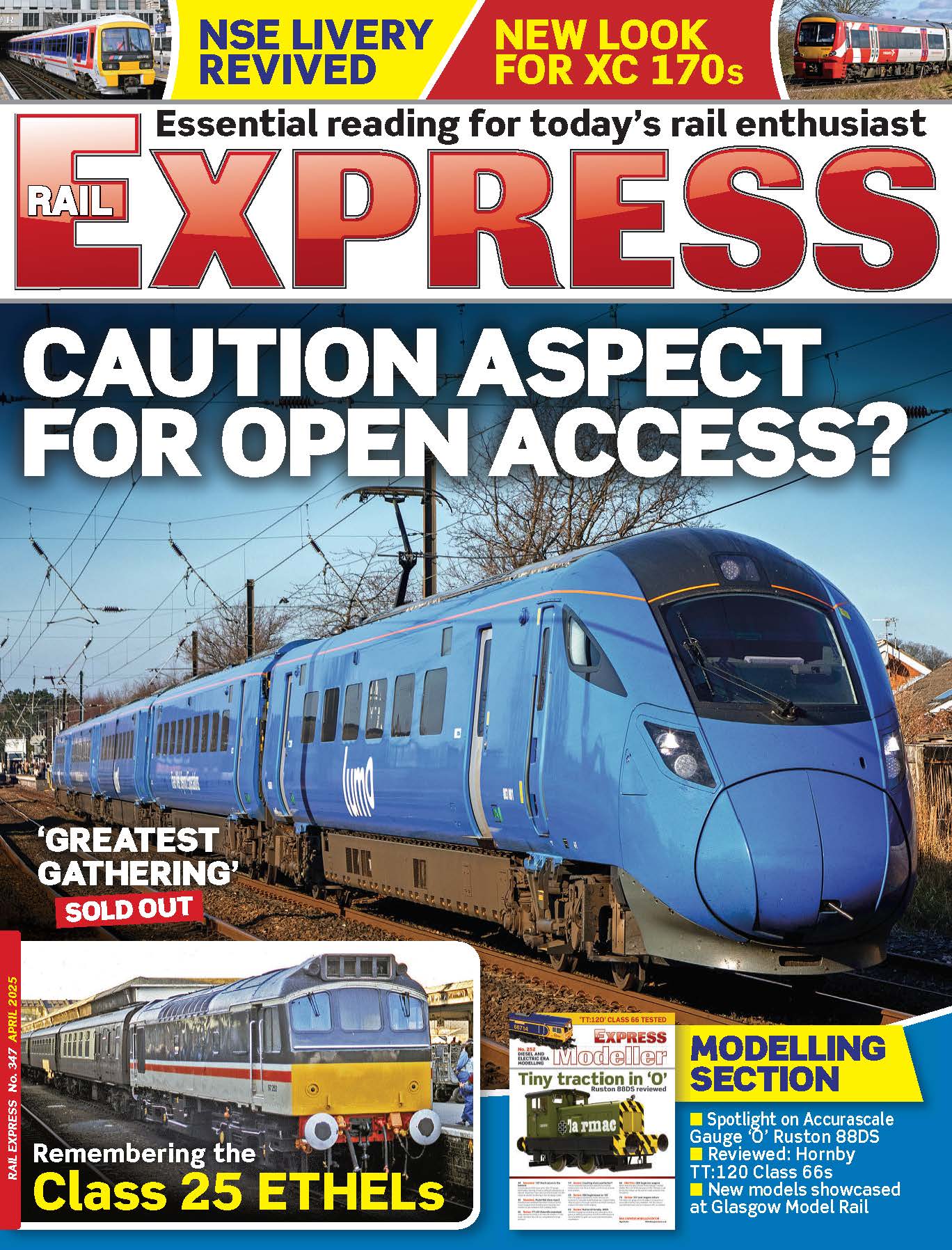Richard Clinnick visits a small team in Great Yarmouth with a large fleet of coaches and even bigger business plans.
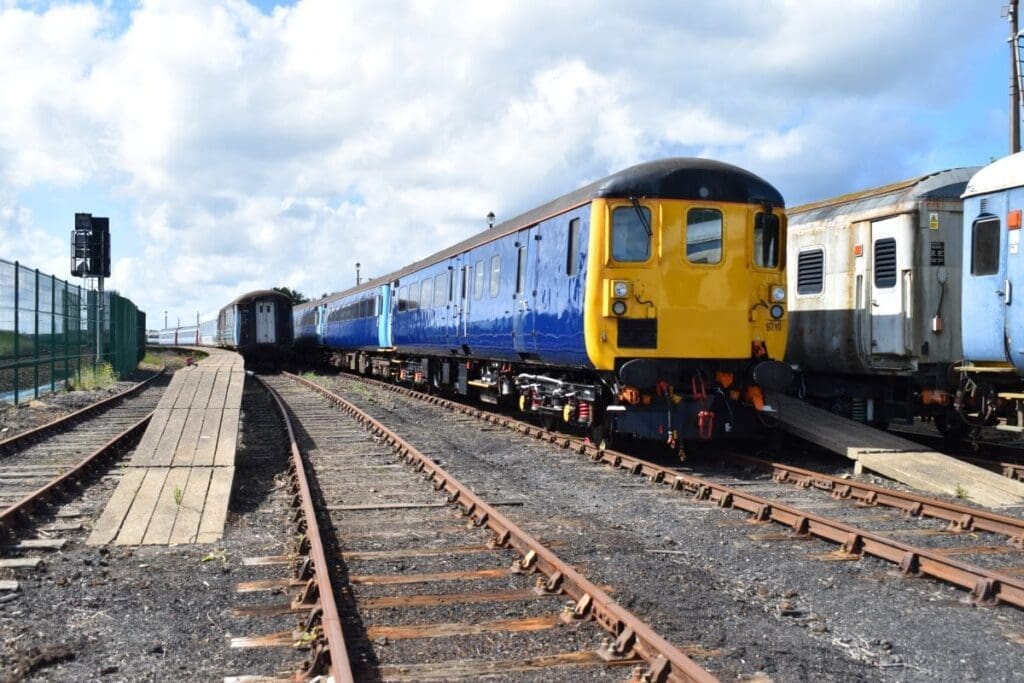
Looking across Vauxhall Carriage Sidings, near Great Yarmouth, it’s fair to say that the facility has not been this busy in decades.
Over the past four years, an array of coaching stock, mainly Mk.2s and Mk.3s with some Mk.1s as well as a Class 08, a ‘31’ and even a ‘321’, have all been acquired by Eastern Rail Services (ERS), which operates the facility. Most, but not all, have moved to the Norfolk site for storage, repairs, restoration, routine maintenance and subsequent commercial duties.
Enjoy more Rail Express Magazine reading every month.
Click here to subscribe & save.
ERS has taken advantage of the introduction of new fleets across the network to acquire vehicles that had been refurbished only a couple of years before being returned to their various leasing companies, or owners. These include the ex-Greater Anglia Mk.3s and former Direct Rail Services Mk.2s. Walking through them, as Rail Express did during a visit to the site in April, it is noticeable how good a condition these vehicles are in internally.
However, ERS has not rested on its laurels. It has sought to acquire vehicles for a multitude of purposes. Not everything that moves to Yarmouth by rail (or road) will return to traffic. Some stock has been acquired just for components, for example bogies and doors are a hot commodity, and it makes sense to buy a vehicle and use it as a coach-shaped box of spares rather than try and acquire the individual component – after all, there will likely be other parts that could also prove useful. James explains that the former Chiltern Railway Mk.3s on site were bought for that purpose, and that all bar No. 12036 have no long-term future. It was for the same reason that the former ‘Pretendolino’ Mk.3s were acquired as they had only recently been overhauled and then not seen much use. “The value is in the spares,” he says, citing that bogie overhauls cost around £37,000 each, whereas coaches are acquired for far less.
Crucially, as these vehicles have been bought almost straight from service, they are up-to-date in terms of being fitted with central door locking (CDL) and some, such as the former DRS Mk.2s, controlled emission toilets (CET) and modern monobloc wheelsets. Also within its fleet are the GA Mk.3s all fitted with accessible toilets.
But even when the first Mk.3s were arriving at the start of the Covid-19 lockdown in March 2020, you would have been hard-pressed to see High Speed Train power cars and stock end up at the site, but that is what has happened as ERS has created a partnership with Romic International Ltd which has seen more than 20 power cars and more than 30 Mk.3s exported to Mexico and Nigeria.
That ERS continues to expand, rapidly, away from the glare of the public is a testament to the team of five men, led by James Steward, who built the company from scratch. What was originally a hobby has turned into a business which supports not only the rail industry in this country, but emergency services and filming companies.
If you have seen a train on Sky TV in recent months, the chances are that the vehicle was from the ERS fleet. Travelled on the Great Western Railway ‘Night Riviera’ in recent months? ERS has supported GWR with components to prevent cancellations. Been out to see the Rail Operations Assets Ltd (ROAL) Class 93 tri-mode locomotive undertake its first loaded main line test runs? It was hauling ERS coaching stock.
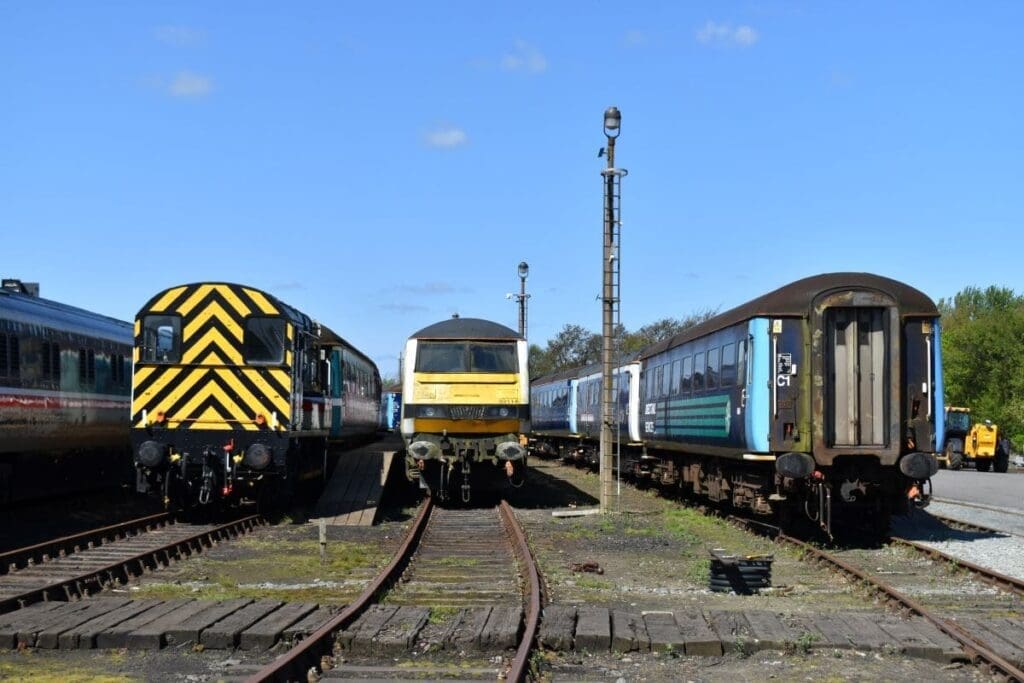
Humble Beginnings
Eastern Rail Services began as a hobby. Prior to the company being created in 2011, those involved in the business today were volunteers at the Mid-Norfolk Railway. The MNR was embryonic at the turn of the century. A growing diesel fleet required rolling stock and a decision was made that an air-braked rake of stock, painted in blue and grey, would offer the railway a unique selling point. Up to that point the MNR only had vacuum-braked stock.
To organise diesel galas, which were growing in popularity across the heritage sector at that point, James, working alongside Paul Hughes (who at that point was working for Freightliner), visited and assessed rolling stock that was being made available as more locomotive-hauled trains were being replaced by multiple units.
One such opportunity came via Riviera Trains which wanted to dispose of vehicles, and so a Mk.2a BFK (Brake First Composite) was acquired.
As the MNR grew, so more locomotives and coaching stock arrived, and events grew bigger. The Stratford 47 Group had already established a base at the railway when it decided that its main line-certified locomotive, No. 47580 County of Essex, would be based there. One possible idea that was floated was for the ‘47’ to haul trains between Dereham and Norwich using the air-braked stock, while football specials were also considered. However, both required carriages that were main line-registered and, at that point, the MNR didn’t have any.
Enter Dave Morphew. At the time he worked for Eversholt Rail which was disposing of all manners of rolling stock as yet more locomotive-hauled trains were being replaced by units. He was advising James and the others who would eventually form ERS, of what stock was becoming available. Of particular interest were the air-conditioned Mk.2s stored at MoD Kineton and Long Marston, and some which came straight out of service from the local train operator. It was never intended that the vehicles were owned by a private company, the plan was for the MNR to have its own rake of mainline coaches but at the time it just didn’t have the finances.
It was around this time that another pivotal moment happened, the collapse of Cargo-D. This had a fleet of Mk.2s and Mk.3s, painted in blue and grey livery, which had been hired to operators or used on its sister company Rail Blue Charters trains. At the same time, Mainline Rail, which had risen from the ashes of FM Rail, made its stock available and these were all snapped up by what was to become ERS.
In 2011, ERS was officially created. Main line-registered stock owned by the new company was moved to the Weardale Railway where it was used on Polar Express trains with power provided by Garcia Hanson’s fleet of Class 31s. This work proved lucrative enough to enable ERS to acquire Mk.2f Open First (FO) No. 3385 and Mk.2f Open Brake Standard (BSO) No. 9513. Buying these was key; they were not for hobby purposes, but purely for business, and it was at this point that ERS began to move away from what had been a hobby to a serious venture. Until that point the hobby needed to make money but that money was invested back into acquiring more stock. Buying Nos. 3385 and 9513 enabled ERS to plan main line operations, as having an FO and a BSO in their main line fleet could support the through-wired rake of Mk.2e and Mk.2f stock which had been used by Wessex Trains (and which had been bought from Mainline Rail).

Caledonian Sleeper
Despite having those vehicles, there were no main line duties. That was until Serco won the Caledonian Sleeper franchise in 2014. CS operations began on April 1, 2015, with GB Railfreight contracted to operate the trains. CS had announced that a fleet of CAF Mk.5s would replace its fleet of Mk.2s and Mk.3s from 2018, however the older fleet was already suffering reliability problems.
ERS had built a network of contacts within the industry by this point, and a meeting with GBRf head of rail services Paul Taylor took place, which resulted in the creation of a plan to support CS including hiring ERS vehicles for main line operations. Furthermore a maintenance plan was created that would enable the older stock to be usable through until 2018. ERS, working with John Campbell, created a life-extension plan for the CS Mk.2 fleet. As part of the plan the work was to be undertaken at Wolsingham. A deal was also struck whereby ERS would purchase the Mk.2 fleet and lease it back to CS. Ownership of the vehicles changed as they arrived at Wolsingham. This allowed ERS to expand its fleet rapidly and add newly-overhauled, main line-certified rolling stock to its portfolio.
As it happened, the CAF fleet was delayed until 2019 and the final train formed of Mk.2s and Mk.3s ran in October of that year. It was also around that time that ERS found work for some of the coaches. Network Rail required coaching stock fitted with CET for its locomotive-hauled infrastructure monitoring trains. A six-month deal was concluded that saw Mk.2e Open Brake Unclassified (BUO) Nos. 9801/803/806/808/810 join the NR fleet. Five years later they remain on hire and ERS has just signed a further long-term agreement for these vehicles which will see a major refurbishment take place and an additional vehicle added to this pool.
As the rest of the CS fleet was withdrawn, so ERS took advantage of the market to acquire Mk.3 Sleeping Car With Pantry (SLEP) Nos. 10501/502, 10600 and Mk.3 Sleeping Car (SLE) No. 10699. They, along with a rake of Mk.2s, were moved to Great Yarmouth in December 2020.
Depot Facilities
Using Vauxhall carriage sidings came about because of capacity constraints at other sites. Both the Mid-Norfolk Railway and Wolsingham were full, but opportunities were becoming ever more often for ERS to expand its fleet as vehicles became available.
James and the team used their knowledge of the area to evaluate various sites that could be used for storage and maintenance of their assets. Sizewell in Suffolk was one possibility but was ruled out on size, but the ERS team had already identified that Great Yarmouth would fit the bill perfectly. The facility had been unused since 2000 when EWS served it with fertiliser trains. Since then it became overgrown, however the track remained in situ. There had been plans to store newly-delivered Stadler Class 745s and ‘755s’ at the site until they were needed in traffic with Greater Anglia, but this failed to materialise.
By the late-2010s, Great Yarmouth Borough Council had acquired part of the site to protect it from redevelopment but also with the possibility that it could support freight through the town’s Outer Harbour. While the council owned roads 4-6 (nearest to the A47 road), Network Rail retained ownership of roads 1-3 (nearest the running lines).
A major resignalling scheme had been planned which included the removal of semaphores. As part of this, Vauxhall carriage sidings were to be disconnected from the main signalling panel, thus preventing GA from using the site. However, this did not stop the site from being operational and that enabled ERS to be granted a licence to use it by the council. Its good access, size and proximity to ERS family homes made it an ideal location, says James.
It was after that that vehicles began to arrive, as well as No. 08762, which was used to shunt the stock. But it was also part of the next chapter for ERS.
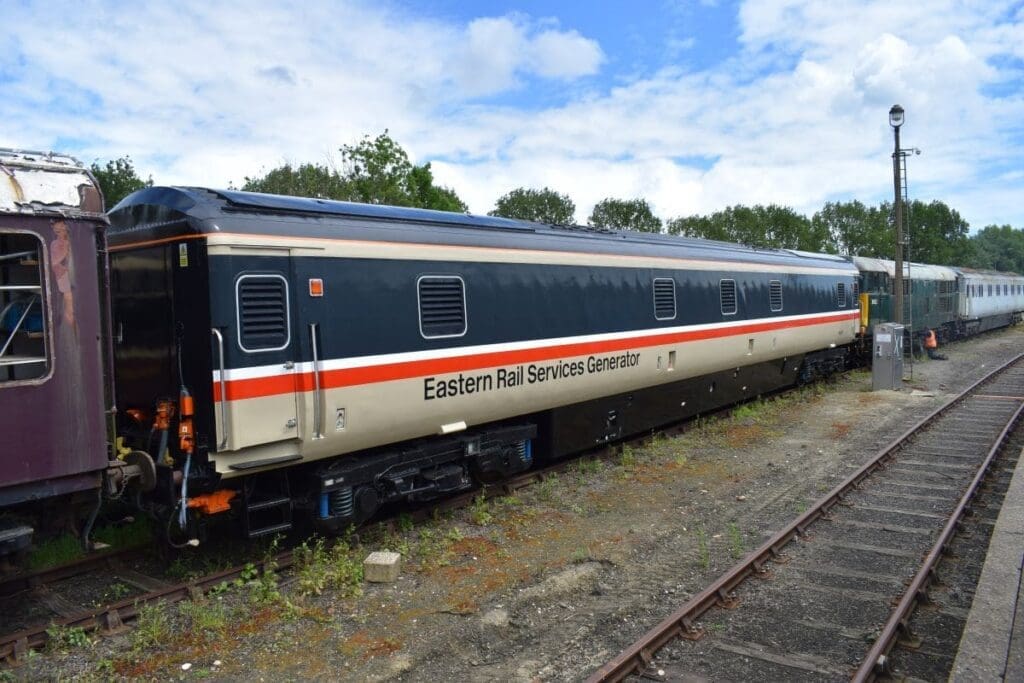
RMS Locotec
In 2019 ERS, working with financiers, agreed a management buyout of RMS Locotec, which had been on the market for several months.
The acquisition brought with it a large portfolio of shunting locomotives and associated contracts, rolling stock, infrastructure and infrastructure upgrade capability. The companies remained independent of each other which meant that when RMS conducted track improvements at Yarmouth it was paid the commercial rate.
Also part of the acquisition was No. 31452. The electric train supply-fitted locomotive had been based at the Dartmoor Railway where it had been hauling Polar Express services, but was moved to Yarmouth by road to start a new career. Although it has been used to shunt stock at the site, and providing ETS for various vehicles, it is also main line-certified and fitted with all the relevant safety equipment required to allow it to operate on Network Rail metals. However, it is currently not able to leave the confines of the ERS site under its own power as it is not in the correct place in its maintenance cycle, although this is a relatively simple fix. Nevertheless, it is operational and, as this issue of Rail Express went to press, it was due to leave by road for a filming contract at the Embsay & Bolton Abbey Steam Railway with potential mainline work in the offing after this.
There have been further acquisitions since those early days, including all five former European Passenger Services (EPS) Mk.3 generator vans that were converted for planned Nightstar services that failed to materialise. One, No. 96371, has just spent more than a year on hire to CS at Inverness, while another, No. 96374, has been repainted into InterCity livery. They are used at Yarmouth to heat stock while the industry also remains very interested in hiring these vehicles. They have initially seen little use but were a significant investment for ERS and the foresight has recently paid off with a major hire contract for a generator coach about to be signed, as well as the ongoing Caledonian Sleeper hire.
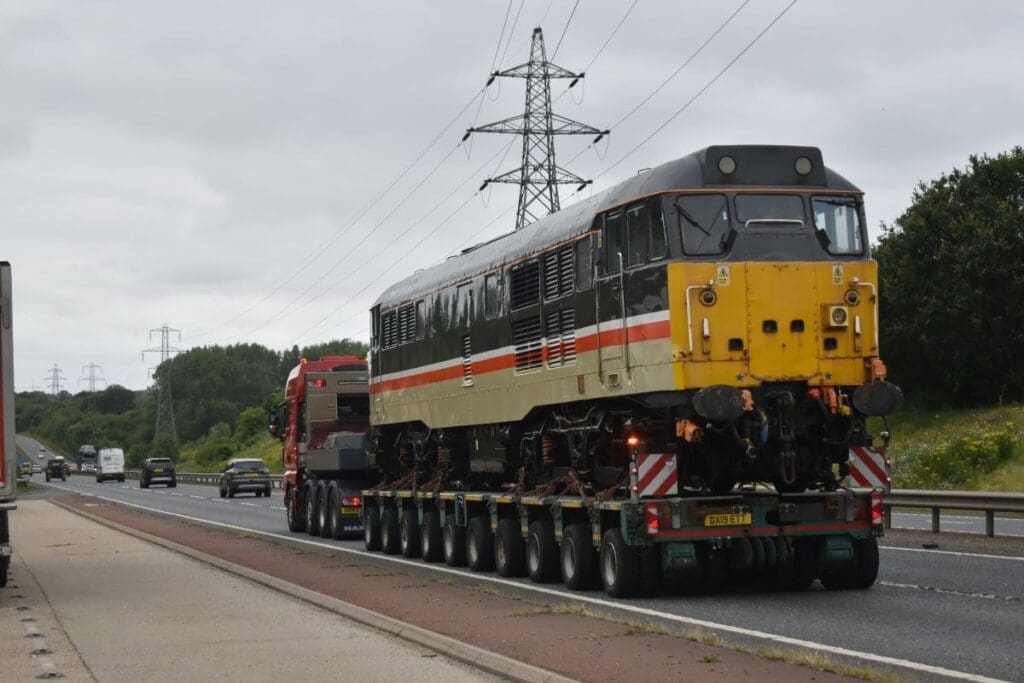
Charter Market
The ongoing saga regarding central door locking (CDL) and the need to meet Office of Rail and Road (ORR) requirements has been brought into sharp focus in recent months. ERS’s fleet features rolling stock fitted with both CDL and CET (previously mentioned) while there are also Open First (Disabled) Mk.3s in the fleet with fully-accessible toilets, meaning the company can support the modern charter market with up-to-date stock, most of which has been refurbished internally within the last decade.
James confirms that there has been extensive interest in ERS stock from both charter promoters and operators, and that the company will, in time, provide stock for both. Ideally the plan is for a rake of Mk.2s and a rake of Mk.3s to be made available. Discussions have been held regarding exact requirements while there is also every chance that mixed sets could be used, as per the eight-coach rake used by ROAL for its Class 93 testing.
Furthermore, ERS continues to acquire coaching stock with ex-GA Mk.3s recently bought from the Northampton & Lamport Railway and other preservation groups. Main line operators, too, have sold stock to ERS. Not all will return to use, with some providing much needed components not only for the operator but for its clients too. Acquiring coaches for component recovery also allows ERS to keep hire costs down as it can undertake its own engineering either at Great Yarmouth or by sending stock to sister company Independent Rail Services (IRS) in Chesterfield.
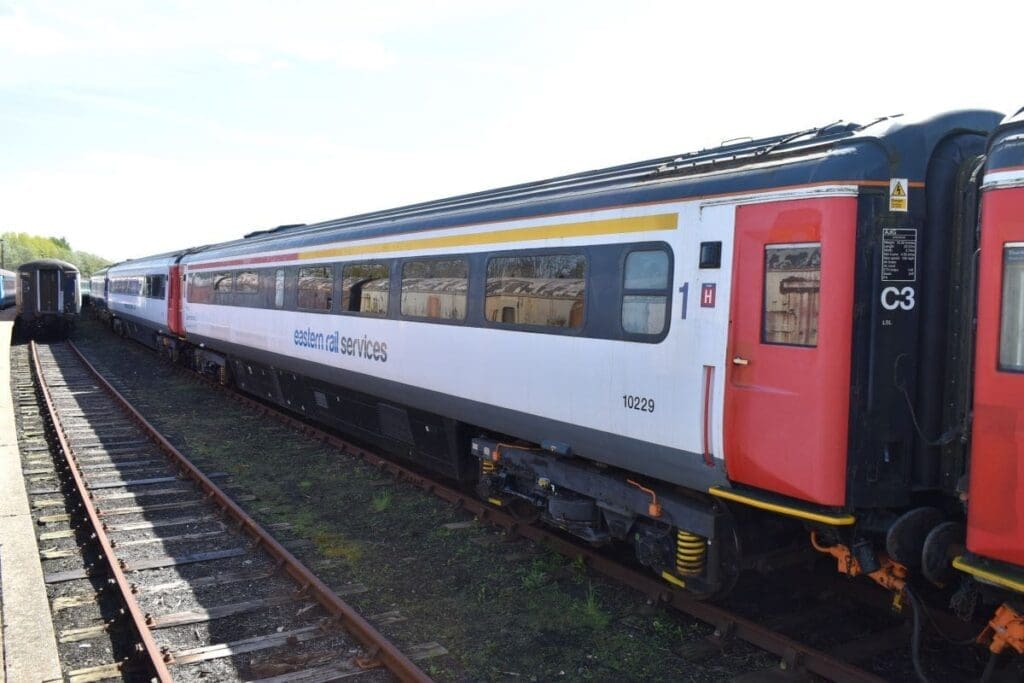
Future Opportunities
Not all the coaches acquired from the NLR are likely to be used in charter services. James points to ex-GA Mk.3 Driving Van Trailer No. 82114 and suggests that there could be other uses for the coach. “It is initially here for store, but we have that and three Mk.2 DBSOs (Driving Brake Standard Opens) and these offer opportunities for the industry. Thinking out loud, could we fit the DVT with a generator, could it be used for test trains or even railhead treatment trains?”
He looks at other vehicles on the site. “We have a Mk.3 Kitchen Buffet First (RFM) – could that be converted to a full kitchen car for charter trains? We have three FODs so do we convert one back to an FO? We have Mk.3As and Mk.3Bs and so could we convert No. 12180 back to an FO as it was built?”
James says that charters, he thinks, need a minimum of four and up to six first class coaches. “Mk.3s have 48 seats per first class coach so that would be 168 seats across four coaches. So you could have three FOs and one FOD?”
One thing lacking at Great Yarmouth is undercover accommodation, but that is set to change in the coming months. Plans to move the shed from Okehampton have been shelved. Already a new 250-metre-long siding has been built at the ERS facility and this is enough for eight to 10 coaches. This is likely to be used for stock owned by Romic International Ltd, which works with ERS. These coaches will be stored at the site until they are either exported or new uses are found for them. When Rail Express visited, Romic vehicles on site included four ex-GWR Castle Mk.3s (Nos. 48140-142, 49114), 14 former CrossCountry Mk.3s (Nos. 41035, 42037/038/051, 42234/290, 42342/368/369/371/372/379, 45001/004), one former London North Eastern Railway Mk.3 (No. 41087) and six HST power cars (Nos. 43006/027/029, 43112, 43238, 43319). More are expected to arrive in the near future, including 12 former GWR Castle Mk.3s (Nos. 48127-129/143-148, 49110/115/116) which are currently at Norwich Crown Point.
The partnership with Romic, James says, was too good of an opportunity to miss, but has opened new possibilities including a new, larger shed and running trains, such as on November 12 when ex-XC Nos. 43007 and 43378 powered a Great Yarmouth-Norwich return to demonstrate the rolling stock available to various potential customers. Subsequent to this, March 2024 saw four vehicles go on hire to Colas Rail for Midland Main Line electrification testing, and further main line hire for HST vehicles is in the pipeline. He confirms that ERS will retain overall control of the site and that other things beside HST vehicles will soon be heading to site. Keep an eye out in future editions of Rail Express for the latest news on any arrivals!
The current plan is for a temporary structure to be erected measuring 50-metres long with two roads. This will be built in existing sidings and will enable vehicles to be prepared and painted on site. Already an off-site warehouse has been acquired with parts stored there. ERS is also exploring recruiting engineers to look after its rolling stock. “We have got to the point we need someone here,” says James. “The last year has really taken off with the filming and then the HSTs solidified that we needed extra support.”
Longer-term the plan is for a permanent 50m-long building capable of housing four vehicles and equipped with pits and lifting jacks to allow more in-depth work to be carried out. James says that the temporary structure will likely be in place by summer 2024 while the permanent building is likely to be constructed in 2025.
Yet walking around the yard there remains vehicles that are part of the “hobby” side of ERS. Vehicles such as Nos. 3164, 6415, 13573 and 92901. These could all be useful for charters, or heritage, but which ERS have not had the time to work on.
“We are a victim of our own success. This has grown a lot quicker than we imagined. Testing, test trains, filming, charters and export work – we could not have imagined all that would have been part of the business so quickly.”
When five coaches arrived at a recently cleared redundant carriage siding in Great Yarmouth in 2020 there was scepticism. Now, four years on, with major expansion plans, contracts across the country with multiple operators and a recruitment drive planned, there is little doubt that ERS has been anything other than a success.

Eastern Rail Services fleet
1210/220, 1692/696, 3133, 3181, 3277/295, 3374/385, 3411, 5482, 5647, 5787/797, 5810/866, 5906/919/937/960/989, 6046/059/064, 6168/173, 6415, 6700/703, 9448/497, 9500/513/525, 9705/709/710, 9800-03/05-08/10, 08870, 10229/237/249/259, 10413, 10501/502, 10600, 10699, 11048/074/078/090/095, 12021/032/036/043/049/064/067/078/091/094/097/098, 12118/122/133/138/176/180/182, 13573, 17033, 17079, 17164, 31452, 35292, 42504/511, 44059, 82114, 86443, 86606, 92901, 95199, 96371-375, 99884, 321434, 977390, 977591/595.



